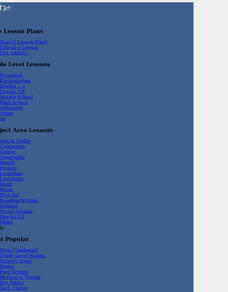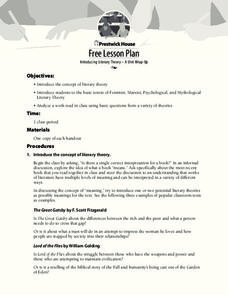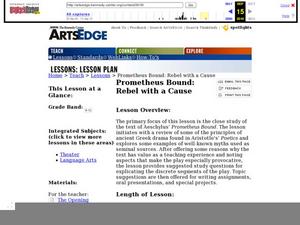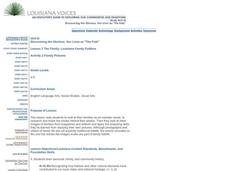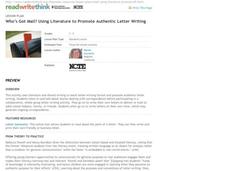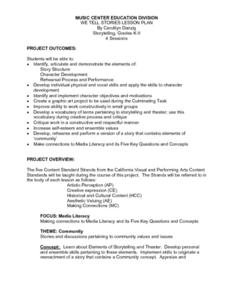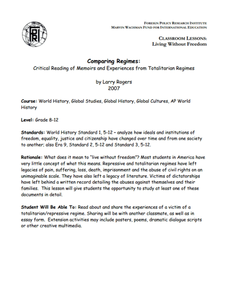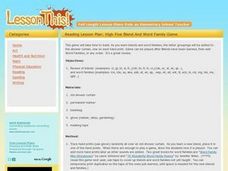Curated OER
Analyzing Verb Use: Part 2
With the Wordle ap in one hand, and their favorite writing piece in the other, 3rd graders analyze their verb usage. They select a piece they have written, type it into Wordle, then analyze their word choices and alter them using synonyms.
Curated OER
Know Before You Go: Anticipating and Previewing Difficult Texts such as The Bluest Eye
Support your scholars with these anticipatory questions to go along with The Bluest Eye by Toni Morrison. The objective, rationale, and teacher instructions are clearly explained, followed by an anticipation guide for pages 81-93 and the...
PBS
Finding Story Ideas
Pitch your best news story to your news team, or the peers in your journalism class, with a lesson about finding, reporting, and presenting a story. After watching clips of different examples, as well as strategies for finding...
Curated OER
Language with Linguistic Legos
Learners visualize and manipulate sentences as building blocks, and, given a key, use Legos™ to demonstrate how to construct sentences of variety (simple, compound, complex, and compound-complex).
Art Institute of Chicago
Lesson Plan: A Writer’s Odyssey
Looking for a fresh approach to an end-of-unit project for The Odyssey? Check out a resource that has class members write their own hero's journey short story and then craft an illustration that depicts their tale. Apollonio di...
Prestwick House
Introducing Literary Theory – A Unit Wrap-Up
Literary theories are lenses through which a text may be analyzed. The question in this lesson plan is how a particular literary lens can influence the reader's view of the text.
Curated OER
Welcome to the Neighborhood
In this neighborhood worksheet, students write five words from the word families -ap, -ash, and -at. Students write their answers in the windows of the corresponding word family's house.
Curated OER
Family Word Slide "ap"
In this literacy worksheet, students are given the letters and the spaces in order to create new words that share the suffix of "ap".
Curated OER
Language Learning Course Case Study
Students analyze data concerning possible language learning training. In this business and language learning course, students work in groups to analyze data and determine which is the best method of language learning for a group of...
Curated OER
Prometheus Bound: Rebel with a Cause
If you are teaching Aeschylus' Prometheus Bound, you can't afford to miss this source. An extensive list of ideas outlines numerous discussion topics, writing prompts, comprehension questions, oral presentations, and projects. Have class...
Curated OER
The Family: Louisiana Family Folklore
Every family has a different story to share. Your learning community examines the checklist that applies to the lesson, share some of the teacher's family photos, and look for clues in their own family photos in order to complete a...
ReadWriteThink
Who’s Got Mail?
Today's kids are probably not familiar with the conventions of letter writing, due to the boom of technology. Here is a lesson that will provide opportunities for formal and informal letter writing.
Curated OER
Show And Tell
Have you ever saved your money to buy something you really wanted? Elementary schoolers share how they saved their money for things they wanted, and they bring in one or two items that they bought with their personal savings.
Curated OER
We Tell Stories
Young readers bring characters to life by working in small groups to script and perform stories that contain a community concept. Detailed questions and activities are outlined for the class. Consider having your groups create...
Foreign Policy Research Institute
Comparing Regimes: Critical Reading of Memoirs and Experiences from Totalitarian Regimes
Can you imagine living in a totalitarian country? Learners will read several primary source memoirs to gain a deeper understanding of what life is like under a controlled government. They'll discuss each piece in pairs, research...
Curated OER
Wiki Comment: The News and You
Kids explore the world of news media by creating a wiki page. They will create a wiki page on the Internet in order to comment on and question the stories that take place in the world. They will practice creative writing by summarizing...
Curated OER
High Five Blend and Word Family Game
Practice using word blends and learning about word families by participating in a class game. Learners will collaborate as teams in a game by throwing beanbags onto a shower curtain with word blends on it. They will say the sound their...
Curated OER
Persona in Autobiography
A talkative old man? A naïve believer in Human Perfectibility? A Sage? Who is this guy, anyway? The Autobiography of Benjamin Franklin launches a study of the way Franklin uses structure, style, and purpose, as well as different...
Curated OER
"The Lottery," by Shirley Jackson
Middle schoolers who are about to read the chilling tale, The Lottery, do some writing beforehand. They are asked to write how their lives would change if they won a huge lottery jackpot. Then, they read the short story, and will be...
Curated OER
Allusions to Shakespeare in Popular Culture
Send your high schoolers on a scavenger hunt through popular culture (music, television, video games, movies) to find allusions to Shakespeare. They must each provide three to share with the class, and the one they present cannot have...
Curated OER
Maps and Legends by Micheal Chabon
Students read an essay to improve language skills and understanding of American culture for ESL teachers. In this American culture lesson, students read the essay 'Maps and Legends' by Michael Chabon and complete various activities to...
Curated OER
Understanding Irony
Students discuss irony. For this language arts lesson, students identify irony and give examples of irony from their lives, a book, and current events. Students classify types of irony.
Curated OER
Preparing Students to Read the Aeneid
Teaching the Aeneid this year? Read this quick article to develop some plans and strategies for teaching the epic poem to your advanced learners.
Curated OER
Voice and James Joyce
After reading a text written by James Joyce, middle and high schoolers find examples of passive voice. They share their findings with the class. Use this lesson to emphasize the effect of passive voice in writing.





